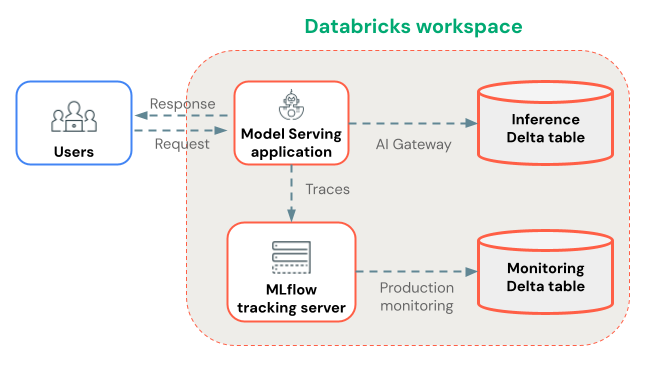Note
Access to this page requires authorization. You can try signing in or changing directories.
Access to this page requires authorization. You can try changing directories.
MLflow Tracing provides comprehensive observability for production GenAI apps by capturing execution details that you can view in the MLflow UI or analyze as tables. This page provides a feature reference detailing deployment options for agents or apps with MLflow Tracing, including trace logging options and governance details. For guides and tutorials, see Deploy agents with tracing.
Trace logging options
Traces can be logged to the Databricks MLflow Tracking service or to Delta tables. The image below shows an example architecture using all logging options, in order to illustrate the data flow.

| Trace logging option | Access and governance | Benefits | Limitations |
|---|---|---|---|
| MLflow experiment | Traces can be viewed in the MLflow experiment UI or queried programmatically. Access is governed by MLflow experiment ACLs. | Real-time logging. Supports very large traces. | 100K traces per experiment. Max 60 queries per second (QPS). Ask your Databricks account team for help to raise these limits. |
| Production monitoring | Delta tables are governed using Unity Catalog privileges. | Supports very large traces. | Same as MLflow experiment logging. ~15 minute delay. |
In the table above, if the MLflow Experiment is created with a custom storage location for artifacts, then the experiment's trace data will be stored in your specified location. Specifically, if you create a workspace experiment, you can set a non-default storage location for artifacts and trace data by specifying an artifact_location such as a Unity Catalog volume. In this case, trace data access is governed by the location's permissions, such as Unity Catalog volume privileges.
Deployment options for tracing
Databricks supports deployment inside and outside of Databricks, with MLflow 3 and MLflow 2. The choice of deployment method affects the logging options available:
| Deployment location d - Deployment method |
MLflow experiment logging? | Production monitoring? | Inference tables? | |
|---|---|---|---|---|
| Databricks | Agent Framework (recommended) or custom serving deployment | Supported | Supported | Supported |
| Outside Databricks | Custom deployment | Supported | Supported | Not supported |
Guides and tutorials
Feature references
For details on concepts and features in this guide, see:
- Production monitoring concepts - Understand how MLflow enables continuous quality monitoring
- Tracing data model - Learn about traces, spans, and attributes
- Logging assessments - Understand how feedback is stored and used